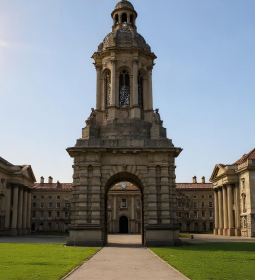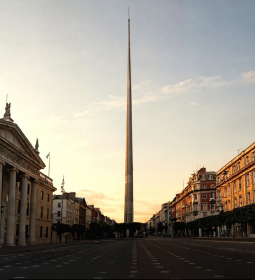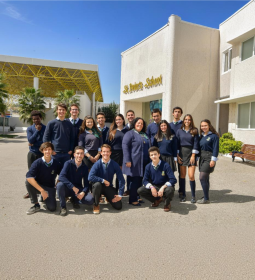One of the most noticeable and attractive features of student life abroad, which distinguishes American and many European universities from domestic ones, is campuses. Generally, a campus is a large educational institution, on the territory of which there is everything that students may need during their studies and in their free time, including libraries, shops, cafes.

Campuses came to the world from Great Britain: the first local universities was founded as structural units at monasteries, and then, when monastic lands and possessions were secularized, universities became the owners of the entire complex of monastic property (minus land). Such an approach to the organization of studying process largely determined the features of the development of the English model of education and its popularity as a direction of educational tourism.
Campuses, however, are located not only in the United Kingdom — there are many of them in the United States and former British colonies and dominions; Many Northern Irish, Australian, Canadian, and New Zealand universities are located on this principle, as are universities in South Africa, India, or Pakistan (especially universities of the colonial period). There are campuses outside the influence of the English "crown", for example, in Germany, China, the Republic of Korea, as well as individual university campuses in France, Spain and Finland with Iceland.
When is the best time to choose a university with a campus?
The campus is not just a piece of land with a fence and university buildings, it is also a special look at how the educational process and extracurricular activities of the student community are organized. In other words, how students live, study, and have fun.

The studying on campus contributes to the formation of a friendly and original community. This is not only convenient and comfortable, but also a unique experience, so many foreign students only dream of living and studying at a campus university.
- Everything is close, if not within walking distance: you can run from the laboratory to the dining room, and then to the library in a couple of minutes. Yes, some campuses extend over hectares, but in this case, universities organize internal transport networks.
- Campus is a great place to find friends, make new acquaintances and all kinds of adventures that youth craves so much.
- On campus, life does not stand still: some activities are offered by the university or the student union, and there are a lot of other things besides them.
- Life on campus is very organized, you don't need to think about where to sleep, where to take things to the laundry, where you can eat delicious food and how not to splurge on cafes, restaurants and laundries (yes, students are usually given significant discounts).
- Campuses give more time for personal life, since the student does not need to waste time on endless travel.
Finally, each university is an autonomous unit. In the Middle Ages and even in the Modern Age, students of many universities were not subject to the jurisdiction of feudal or city courts – only the king, so they preferred not to mess with them (especially since universities brought tidy sums to the local treasury). This is not the case now, although the police cannot enter the territory of some French and British campuses without the permission of the rector. But academic freedom and a unique atmosphere have remained intact, so for a student in the UK or the USA, a university is not just five years of life, but a whole world, and they all cherish the experience gained and appreciate the social ties established during their student years, both business and personal.

There are, however, certain disadvantages. For example, it is often said that students live in a bubble, completely confined to the campus of their university. If you study, work, eat, sleep and relax here, why do you need a city outside the university gates? Moreover, it usually takes quite a long time to go to the city: a university needs a lot of land, and in the suburbs it is expensive, so universities often get quite far into the suburbs.
What are the campuses?
Campuses can range from large, accommodating thousands or even tens of thousands of students, or relatively compact, where we are talking about only hundreds or 2-3 thousand students.
- Large campuses give their guests a great degree of independence, it is not difficult to find a place for privacy, and not only because of the fact that there is a lot of space. In small ones, on the contrary, there is a friendly atmosphere and everything is in plain sight, even teachers are more democratic in their contacts with the student fraternity.
- However, there are fewer opportunities here, and the choice of educational courses is usually more modest.
- Small campuses can be located within cities, which is convenient if you work or spend a lot of time off campus. Usually, professional high schools—medical, pharmacological, legal, engineering, and architecture—prefer to be closer to the center of the city.
- Another difference is related to specialization. There are purely student or bachelor's campuses, they are most widely found in the United States and Great Britain: such universities offer dozens, if not hundreds, of bachelor's programs, rich opportunities for choosing accommodation and leisure options. Sometimes students may not even leave for the summer! Programs for undergraduates or doctors are presented much more modestly, or not at all. The situation is the opposite with research campuses: here the emphasis is on master's and doctoral programs, on special areas and separate structures that prepares doctors, lawyers, architects and engineers. It is more difficult to enter here, but the programs are considered especially prestigious, and the diplomas are incredibly respected.
How to choose a campus for study?
Universities with a campus can be very different in size, location, and relations with local authorities. When choosing an educational institution for yourself, pay attention:
- The size of the campus and the number of the students;
- Share of foreign students;
- The location of the campus, its transport accessibility;
- Equipment (number and quality of sports, educational and recreational facilities);
- Opportunitie and cost of accommodation;
- The quality of the housing stock;
- The reputation of the campus (reviews will help here);
- The availability and quality of student support services (e.g., whether there is a clinic on campus, whether dental or psychological help can be sought, whether there is a 24-hour café or other "points of attraction").
By answering these questions, you are likely to be able to understand whether you like and are right for the campus of a particular university — or if you should look for something else.










